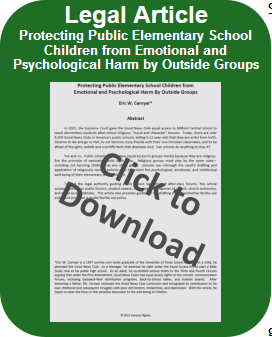Schools Can Protect Students From Extra-Curricular Groups that Psychologically Harm Students
Implement A Smarter Facility Use Policy
In the years leading up to and following the Good News Club v. Milford Central School decision, CEF has filed scores of lawsuits — almost all successful — against public schools that denied “equal access” by Good News Club to its facilities and ancillary benefits such as bus transportation and school information distribution programs (e.g., flyers and permission slips).
 Schools lost those battles (and frequently ended up paying CEF’s attorneys’ fees) because they, or their policies, excluded the Good News Club solely on church-state separation grounds. Public schools with loosely and broadly written facility use policies cannot, under current law, discriminate against after-school clubs merely because they are religious, sectarian, and/or engage in prayer and worship. In a long line of cases, the Supreme Court has consistently held that public educational institutions cannot single out religious organizations for disadvantageous treatment.
Schools lost those battles (and frequently ended up paying CEF’s attorneys’ fees) because they, or their policies, excluded the Good News Club solely on church-state separation grounds. Public schools with loosely and broadly written facility use policies cannot, under current law, discriminate against after-school clubs merely because they are religious, sectarian, and/or engage in prayer and worship. In a long line of cases, the Supreme Court has consistently held that public educational institutions cannot single out religious organizations for disadvantageous treatment.
Facility Use Policies Should Deny Access to Groups that Engage in Psychologically Harmful Behavior
But schools are not required to give equal access to groups, secular or religious, that shame and intimidate children, employ abusive, degrading, and demeaning pedagogy, engage in authoritarian conditioning, intimidate children from engaging in critical thinking, or incite contempt for public school teachers. If a public college “may expect that its students adhere to generally accepted standards of conduct,”1 then surely a public elementary school can expect the same — and more — from outside groups who use the school’s facilities to provide after- school activities or education to its elementary age schoolchildren.
2025 www.goodnewsclubs.info. All rights reserved.